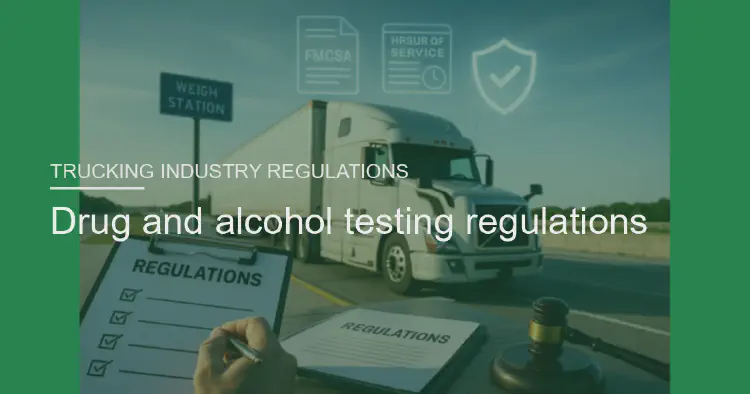Drug and alcohol testing regulations
Because of the enormous risks posed by impaired driving, federal law requires strict drug and alcohol testing for commercial truck drivers. These rules are central to ensuring roadway safety and accountability in the trucking industry.
- Truck Accident Law Team
- 2 min read
Article 5 of 5 in Trucking Industry Regulations/

Drug and Alcohol Testing Regulations
Governing Authority
- The FMCSA, under the Department of Transportation (DOT), enforces drug and alcohol testing rules for commercial drivers.
- Regulations apply to drivers who hold a Commercial Driver’s License (CDL) and operate commercial motor vehicles in interstate commerce.
When Testing Is Required
-
Pre-Employment Testing
- Drivers must pass a drug test before beginning work.
-
Random Testing
- Drivers are subject to unannounced random drug and alcohol tests throughout the year.
-
Post-Accident Testing
- Required if an accident results in a fatality, injury requiring medical treatment, or vehicle towing, and the driver receives a citation.
-
Reasonable Suspicion Testing
- Conducted if a supervisor observes signs of impairment (e.g., slurred speech, erratic behavior).
-
Return-to-Duty and Follow-Up Testing
- Required for drivers who previously tested positive before resuming safety-sensitive functions.
Substances Tested
- Drugs: Marijuana, cocaine, opioids, amphetamines, and phencyclidine (PCP).
- Alcohol: Breathalyzer tests measure blood alcohol concentration (BAC).
- Legal limit for CDL drivers: 0.04%, half the standard for non-commercial drivers.
Compliance Requirements
- Employers must participate in the FMCSA Drug & Alcohol Clearinghouse, a database tracking violations.
- Drivers who fail a test are immediately removed from service and must complete a return-to-duty process.
Penalties for Violations
- Drivers: suspension or revocation of CDL, fines, and disqualification.
- Employers: fines, liability exposure, and possible loss of operating authority.
Legal Significance in Accident Cases
- A positive test or failure to comply with testing requirements can establish negligence per se.
- Plaintiffs’ attorneys often subpoena testing records to prove liability against drivers and trucking companies.
Summary: Drug and alcohol testing regulations serve as critical safeguards against impaired truck driving. By mandating testing at multiple stages and maintaining strict thresholds, FMCSA ensures accountability, reduces risks, and provides essential evidence in accident litigation.
You might also like:
- Tags:
- Trucking Companies
- Accident Litigation
- Drug Alcohol
- Legal Significance
- Plaintiffs Attorneys
- Alcohol Testing
- Establish Negligence
- Commercial Driver
- Commercial Drivers
- Department Transportation
- Liability Exposure
- Interstate Commerce
- Driver License
- License Cdl
- Transportation Dot
- Post Accident
- Drug Alcohol Testing
- Commercial Driver License
- Driver License Cdl
- Department Transportation Dot
- Drivers Trucking Companies
- Post Accident Testing
- Alcohol Concentration Bac
- Blood Alcohol Concentration
- Fmcsa Drug Alcohol
- Impaired Truck Driving
- Reasonable Suspicion Testing
- Legal Significance Accident
- Loss Operating Authority
- Accident Testing Required